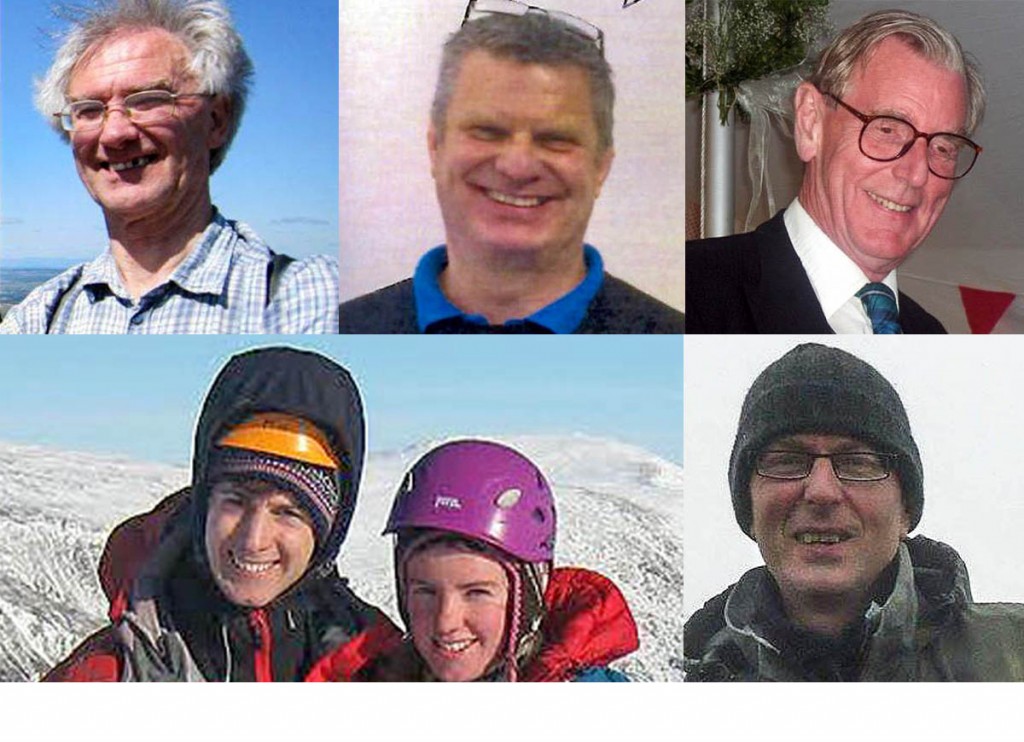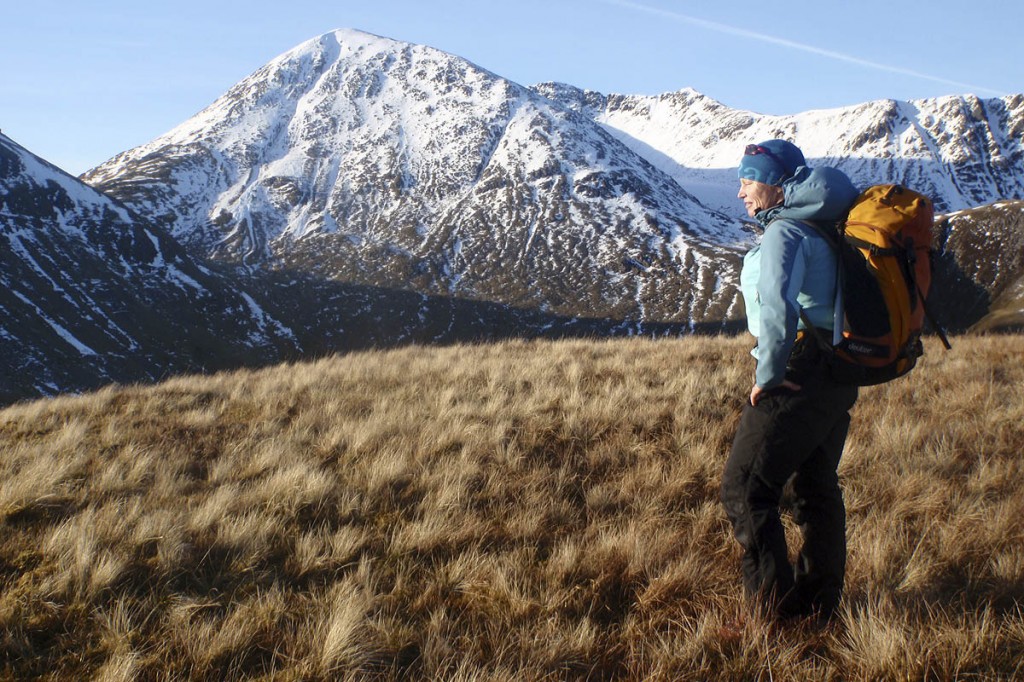The sister of a walker missing in the Highlands for more than eight months pleaded with hillgoers not to be irresponsible.
Marjorie Ballantine, whose brother Tom Brown has never been found despite extensive searches, spoke of the anguish of families whose loved ones never return from the mountains.
She was speaking as police and mountain experts urged walkers, climbers and mountaineers to leave details of their intended route. Without these, rescuers have a much reduced chance of finding stricken outdoor enthusiasts.
With the approach of Easter, Police Scotland and the Mountaineering Council of Scotland jointly urged outdoor fans to stay safe and make the most of the nation’s mountains.
Six people are still unaccounted for in Scotland’s mountains. Young climbers Rachel Slater and Tim Newton went missing on Ben Nevis in February, and earlier this month Jim Robertson from Glasgow went missing in the Cairngorms.
Still missing from the summer of 2015 are three hillwalkers lost in separate incidents in the Lochaber and Glencoe areas: Tom Brown, Eric Cyl and Robin Garton.
Voluntary mountain rescue team members, Police Scotland, RAF mountain rescue and search and rescue helicopters have committed considerable time and effort in unsuccessful searches for all the missing people, even after the chances of recovering them alive have gone.
Marjorie Ballantine spoke out about the grief and uncertainty – and the financial difficulty – that followed in the wake of Tom Brown’s disappearance.
She said: “My experience, following the disappearance of my brother, demonstrates how irresponsible it is to set off alone without indicating to anyone where you are going – and the terrible implications for your family if you do unfortunately sustain a fatal accident and your body is never recovered.
“People like to be free to roam, but they generally have a good idea of one’s objective for a day. When a person goes missing the relatives are faced with awful uncertainty and grief.
“There’s also a legislative process of immense complexity to deal with. While the aftermath is bad enough, the next of kin are unable to administer the financial situation of their missing relative, due to legal issues, and they suffer financial hardship while lacking information about the actions they are able to take in relation to the missing person’s property.”
Police Scotland area commander for the South Highland area, Chief Inspector Brian Mackay, said: “At this time of year, people rightly come to the Scottish mountains in search of the excellent winter sports and mountaineering challenges available.
“As spring is now upon us the conditions are ever changing, people continue to undertake the technical winter climbs, ascending munros which may still be subjected to winter conditions.
“We do not want to discourage anyone from participating in the great outdoor experience but do advocate the benefits of taking the time to share your intentions with another in case things go wrong.
“We work closely with the volunteer mountain rescue teams in Scotland to provide a world-class service any time and in any weather. We have experienced a number of challenging searches for missing climbers in recent months, including for people who have left minimal or no information regarding their intentions.
“When walkers are reported overdue or missing, having left no information about their intended walking route, police and mountain rescue face the potential of having to widen the search to the entire mountain range, which poses a significant challenge.
“We know that not everyone will want to leave a written route card, but we are asking the hill-going public, and even those on lower-level rambles, to make sure that somebody knows where they are going, so that we have a better idea where to look for them if they are overdue.”
Heather Morning, mountain safety adviser with the Mountaineering Council of Scotland, endorsed Marjorie Ballantine’s comments about leaving word, and said: “No one wants to feel as though they are controlled or restrained when they head into the hills; likewise none of us would imagine that it might be ourselves that gets into difficulty.
“However, whenever I go out alone, or with a group, I always let someone know which mountain and route I am heading for. It might be as simple as texting or emailing a friend with my intended plans, or giving someone a call.
“Losing a family member in the mountains is bad enough, but to not have any closure, with no body being found must be the worst possible scenario.”
Ms Morning also advised anyone heading out into the mountains this Easter to check out the current mountain weather and the avalanche and snow conditions to help them plan a great day out.
“Scotland’s mountains are a beautiful, awe-inspiring and challenging environment, and a day out in the mountains, whether on foot or ski, can be a truly magical experience.
“But Easter is early this year and many of the higher Scottish mountains will still be holding snow. Don’t let that magical experience turn into a nightmare for you and your family this Easter.
“Planning ahead and researching your route and conditions will help you decide what kit to take with you. For example, will your intended route cross snow patches? Are these likely to be hard snow? Perhaps your route takes you up a north-facing corrie which will hold snow and likely remain firm while in the shade. If that is the case, then ice axe and crampons will definitely be required.”
More mountain safety information is available on the MCofS website.


Elton Angle-Smith
22 March 2016I wouldn't say it's "irresponsible" to not let somebody know, but my wife will always know my plans. If you're a single person, then a blanket Facebook status will go a long way before you leave. Of course my heart goes out to people that have lost loved ones, and are perhaps wanting some closure; I'm ex Mountain Rescue so can totally understand. Being outdoors or in the mountains is about being free and not being controlled. When I'm out, yes, I'll text my wife if I have signal when I'm off a reputedly dangerous section, for example Crib Goch or after I've past a certain point and add the time in the text and when fellrunning, I'll usually tell her my route and what time I'm descending off the mountain/s via text.
Always carry I.D with an emergency contact number visible in an easy to access place and make sure your phone can be unlocked by somebody else, if you are incapacitated. If you find yourself in trouble and are able, get to higher ground if safe to do so to get a signal and call 999, ask for Police then Mountain Rescue. Ensure your phone is fully charged before you leave and try and use it as little as possible. Always check the mountain weather forecast before you leave. Carry map, compass, whistle, head torch, emergency shelter/survival bag and know how to use all of them. Haven't mentioned the obvious things such as food, clothing.
Most people here should know all this though.
Reality Check
23 March 2016"I wouldn't say it's "irresponsible" to not let somebody know"
Then you're a fool Elton Angle-Smith and I hope nobody listens to your ill-informed advice contrary to the police, MCofS and families of missing people. I don't believe for an instant that you're ex-MRT.
Jennifer Mason
09 January 2019He may well be ex-MR, Reality Check. At least he's not hiding behind a pseudonym, so a quick Google will tell you that he's a very experienced hill-goer.
Despite 17 years in MR (including being trained in Search Management) and being an International Mountain Leader, I almost never leave a route description.
Why?
Simply because I change my plans. I may decide to have an unplanned bivvy and see the sunrise, extend my walk, or even decide to do a completely different hill. It is at least as much of a headache for a Search Manager to be guided towards searching the wrong mountains as it is to not have a clue and think, "OK, what would I do in their position?"
Naturally I'd encourage others to let people know where they are going, but can completely understand why some do not. It isn't as clear cut as you seem to believe.